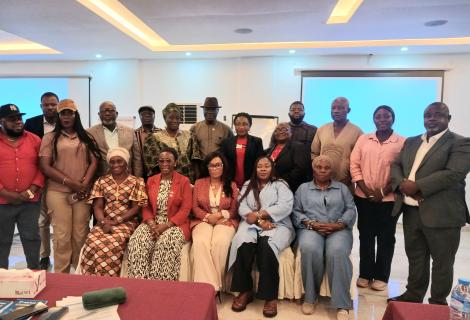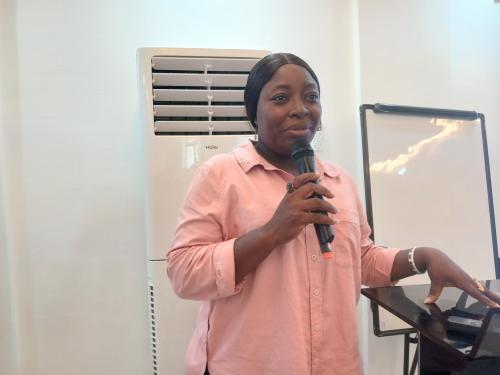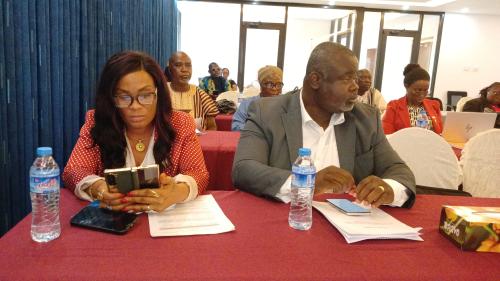Liberia’s journey to ban FGM, ActionAid Liberia, experts, and Liberian Legislators hold consultative to Review Draft FGM Bill

ActionAid Liberia Advances a Range of Recommendations to Parliament as They Review a Draft Bill to End FGM
ActionAid Liberia has advanced a number of key recommendations to the House of Representatives’ Committee on Gender for consideration, as the House last week began reviewing a draft bill presented by President Joseph Boakai that seeks to permanently ban all harmful practices that affect girls and women.
The two days Expert and Legislative Consultation Review of the Draft Bill to Ban Harmful Culture was spearheaded by the House of Representatives' Committee on Gender brought together the committees on Health, Judiciary, Internal Affairs, Child Development and social Services, including civil societies organizations, and traditional leaders.
Presenting the recommendations to members of the various committees, ActionAid Liberia program coordinator, Willet Salue first commended the Liberian President, Joseph Boakai, for taking the courage and exhibiting the pollical will by presenting a draft bill to end FGM and child marriage.
Salue reminded members of the legislature that given the work that ActionAid Liberia has done around girls and women right issues for over two and half decades, as a leading social justice organization in Liberia championing the rights of women, girls, and marginalized communities; putting the quests to ban harmful traditional practices as part of one such critical efforts ActionAid is wholeheartedly in full support of. She said this is all geared towards protecting Liberian girls and women’s health and rights.
In a four-count recommendation, Salue called for legislative enactment, budgetary support, community education about the draft bill and protection for activists, Salue called on the legislature to engage and take more concrete steps this time to officially ban FGM and other harmful practices that affect and limit Liberian girls and women beyond short-term prohibition.

She then called for the legislature to make available adequate budgetary allocation to fund essential services and implement education and protection programs effectively across communities in order to promote positive cultural practices sustainably as the bill subsequently abolishes the female genital cutting aspect of the culture. She than lastly called for the protection of activists and survivors; something she described as critical to advancing gender justice and systemic change.

Speaking at the two days experts and Legislative Consultations Review of the Draft Bill, Hon. Nyahn describes the Women and Girls protection Act of 2025 as one that he says “focuses on some key sensitive issues that they as law makers will be addressing and to address those issues, he said “we have to be sensitive.”
“This bill does not seek to eradicate our traditional practices. Hon. Nyahn clarified as saying. He went further to explain that “if you go into it, what the bill states clearly are harmful practices.” Hon. Nyahn explained dispelling rumors that have been circulating that since the executive presented the draft bill to the legislature.
Hon. Nyahn in his concluding remarks emphasize that as members of the legislature review with draft bill, he called on the all stakeholders to ensure that messaging around the subject matter be clearly communicated in the public.
“From our perspectives as the House of Representatives, why we have taken oat to uphold and defend the constitution, we are equally so under obligation to make sure that the social lives of our people continue and what all of us seated here need to do and think about is the kind of messaging that we will be sending out there, because if the messages is wrong, we will meet a lot of resistance, if we develop the appropriate messages, we will have a lot of partners and champions to join us.
He than announced plan for the holding of several consultative meetings with different actors all geared towards a smooth passage of the bill to protect Liberian girls and women.
Hon. Nyahn was speaking when he proxied for the speaker of the house of Representatives, Richard Koon during the consultative meeting held in Lower Margibi County over the weekend.
These consultations follow President Boakai recent submission of a draft bill, titled "An Act to Amend Chapter 14, title 26, Panel Code, Liberia revised by creating a new sub-Chapter "E" to women and Girls Protection Act of 2025" to the legislature for consideration and onward passage into law.

About the draft bill, the bill is a three page-bill document that many law makers at the consultative meeting said is at the core of way of life of the Liberian society, but quickly recognize the challenges legislative process have faced in passing a law that uprightly end female genital cutting, however they promised to continue lobbying with other members of the house in order to have the requisite number to have the bill passed.
Another law maker, Bomi County District # 2 representative Bishop Mannah Johnson said in order for Liberia to officially eradicate FGM, it must be a joint effort that leaves out no one group of people. By that he meant that there more be holistic engagements an done that respects and involves all actors.
“To have the situation eradicated or minimized, there must be a joint team, NGOs do their part, Internal Affairs does its part, civil society do their part, and the traditional people do theirs, and all have to be a part and they are now telling us the lawmakers to do our part.”
He then went on to cite Article one of the Liberian constitutions which gives power to the people. “Article one says the power is inherent in the people, and because all of the people of these 73 districts cannot come the capital, that’s why they have representation, so who voice should be heard by the citizens should be us.” He said stressing that when the voice is collective, the impacts would be huge in having Liberia closing the chapter to female genital cutting.

Why Setta Saah agrees with the ideas of the president to end FGM, she was very frame in her position that if the engagement is not holistic, especially getting the traditional community, and the Ministry of Internal affairs deeply involved with the process, the bill may get passed at the level of the legislature, but traditional practitioners may still vehemently carry on FGM practices as they some are still doing in face of the current 3 years moratorium.
She recounted saying “2019 when UN Woman made the pronouncement as saying zero tolerant on FGM, I just laughed, and luckily for me through the civil society, I was invited at one of the meetings, where I heard people say that FGM is out of Liberia, I laughed and said it was a joke.”
Setta Saah pointed out that approach back then was a major factor to what she claims have yielded no fruitful result to ending FGM if the coordains of the FGM practices are not fully involved, referring to the chiefs.
Some of the key areas of focus during the joint Legislative committee on Gender Equality, Child Development, and social services, Judiciary, and Internal Affairs to review the draft bill to ban Harmful cultural practices included: political dialogue on the concerns around FGM, way that the bill could be framed as a way of balancing tradition and human rights, and addressing Female Genital Mutilation legal policy perspectives.

Bong County district # 4 representative, Miama Briggs Mensah closed the consultative meeting by thanking ActionAid Liberia, the Women NGO Secretariat, UN Women, traditional leaders, and all other groups that are working with the House’s Joint Committee to have the bill passed.
The joint committee of the House of Representatives was given two weeks to review the draft bill and report back to the plenary in two weeks according to Representative Mensah.
Other recommendations from some members of the House committee that were proffered for consideration during the meeting were that: the heritage centers that were constructed in Nimba, Montserrado and other counties under the Spotlight Initiatives be fully equipped and given budgetary allocation, and that the heritage center be constructed to all the 7 spotlight counties.
Bomi County District # 1 Representative Obediah Varney also recommended that that when the bill is passed, heritage centers should be constructed across all the 11 counties that are practicing FGM and that budgetary allocation be given to those centers for operations.
other participants at the meeting further recommended that a comprehensive data collection of all FGM practitioners be collected from across the country in counties that carry on FGM and that the provision of alternative livelihood that replaces the practices be given to practitioners in a way that is holistic, leaving out no practitioner.
They warned that the failure by the state to put a comprehensive livelihood program in place for former FGM practitioners that replaces the income, given the fact that over the years the Sande Society where FGM is practiced has become a money-making venture for traditionalists, this could undermine the law, if the law is passed.
“During Taylor time, he gives so much high respect to the zoes, so because of that, everyone wanted to become zoes, then everyone started opening their own Sande and Poro Bushes.” Setta Saah the founder of Africa Heritage Foundation told the body.
He went on to say that “If you say they people should leave the practice and looking at the way they make money from it, you need to give them something that they can use to help themselves or else they will still be carrying on the practice secretly as we are seeing it happening I now, right on Newport Street in Central Monrovia, they care carrying on this practice” madam Saah revealed thought she however did not give anther further details, but stated that some families are seeing carrying their girls to a particular house and in disguise that they are going to see a relatives, but in true reality, FGM is being carried inside a house on Newport Street right in the heart of the city.
These consultations follow President Boakai recent submission of a draft bill, titled "An Act to Amend Chapter 14, title 26, Panel Code, Liberia revised by creating a new sub-Chapter "E" to women and Girls Protection Act of 2025" to the legislature for consideration and onward passage into law.
It can be recall, at the United Nations 80th General Assembly in September, Liberian President made a public commitment before the world body committing to ending harmful practices that and Liberian girls and women. In that statement, he pledged his government’s committed to ending FGM and reduce the wave of violence against women in Liberia.
In the President Address bofore the UN he said “Under my leadership, Liberia is determined to move from pledges to results. We pledge zero tolerance for gender-based violence, alongside massive awareness-raising and public education campaigns, and dedicated budget allocations.
We will permanently ban harmful cultural practices , what was once a three-year moratorium will now be enshrined in national law, supported by community dialogues and alternative-livelihood programmes. We commit to a National Action Plan for Young Women and Girls, to give them empowerment, voice, protection and participation in our national life.
Because when women are fully empowered and supported, entire nations thrive.”